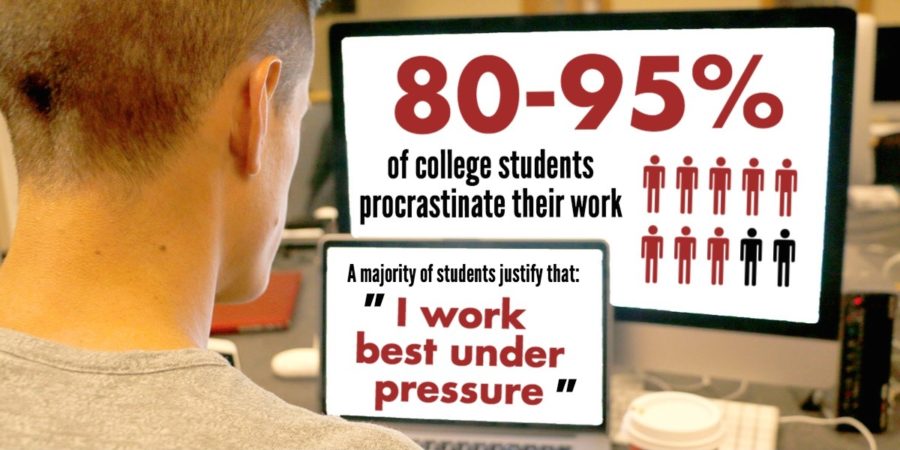Stop Procrastinating App helps students be productive
Janaye Clifford/Iowa State Daily
The American Psychological Association reports that a majority of college students procrastinate because it makes them more productive. Moreover, many psychologists believe students procrastinate because of self-doubt and a fear of failure.
December 3, 2014
Why do it today when it can be done tomorrow?
The life motto of a repeat procrastinator.
Stop Procrastinating is a $9 application aimed to block the Internet on a user’s computer and promote productivity. It is compatible with Macs and Windows.
Blocking Internet access prevents users from procrastinating on websites such as Facebook, Twitter and other distracting sites.
Will Little, CEO of Stop Procrastinating, created the software a year ago.
“People will always procrastinate and find distractions, but the computer is both a work and leisure tool,” Little said. “It is too easy to switch from work to browsing and so far, more distracting than anything else. In fact, work can become a distraction.”
Little said the goal is to allow people to cut online distraction, so they can get more work done and concentrate better.
Users can block the Internet using the application through three options. The first option allows users to block the Internet for a specific amount of time. However, users can access the internet again before the time runs out if they reboot their computer.
Option two blocks the Internet for a certain amount of time, no matter what. Users will not be able to go online until their chosen time is up.
The third option allows users to remain connected to the Internet, but blocks specific websites such as Facebook, Twitter or any other social media site indefinitely.
Little said he came up with the idea after he struggled with getting work done.
“I’m a writer and was writing a play, when I found myself being distracted by the Internet, reading emails and browsing the Internet,” Little said. “I couldn’t find any software to meet my needs so I created it myself.”
Thousands of people have downloaded the software, Little said.
Little’s largest target demographic is writers and college students.
Drew Sprangers, senior in agricultural engineering, said he is guilty of procrastinating often.
“It seems with every assignment I try to start as early as I can, but if I’m at home, the TV and my laptop’s right there. I turn that on instead,” Sprangers said. “It seems like I’ll have a whole day, but I’ll spend two hours actually doing what I need to do.”
Sprangers said when it comes down to it, he can get his work done. It just may be a little closer to the deadline than what he is comfortable with.
Emilee Mayer, sophomore in microbiology, said she has a problem procrastinating on a regular basis because of the Internet, despite the stress procrastination causes her.
“It usually depends on what the project is,” Mayer said. “If it’s a really hard one or one that’s going to take a lot of time, I start it about halfway through the week. If it’s something I don’t think will take long, I usually do it the night before.”
Mayer said she does not think her procrastination has affected her grades at all.
“It makes me have to think quickly,” Mayer said. “I don’t have to second guess everything, but I don’t know if that has something to do with it.”
Mayer said she would be interested in using Stop Procrastinating but isn’t sure because of the price.
Little said the price should not be a problem because it was created to be affordable to everyone.
Sprangers said he would be interested in the application as well but was also hesitant. Since he uses the internet for his assignments, it may not be as useful to him.
“I think if I had that, I would probably use it for the book homework I had,” Sprangers said. “It would help cut down on random searching. I feel like it would help me keep focused on what I need to do.”
Little said he has received plenty of positive feedback from his software.
“People write saying they love a particular option, say option two and option three are big hits with people,” Little said. “Many people say it genuinely helps them study.”
Jennifer Owens is the director of student services for the College of Liberal Arts and Sciences, and has been advising students since 1998. She deals daily with students suffering from procrastination issues or poor academic success.
Owens said as an adviser, she sees different reasons for an individual to procrastinate or get behind in a class.
“Describing it just as procrastination is just kind of reaching the surface,” Owens said. “My thoughts are that many students don’t think about why they are in college. Because of that, they prioritize things in a way that is not beneficial to their academic progress.”
Owens said if students would embrace learning rather than focus on other aspects of college, then she believes the work would not be put off.
However, Owens said procrastination may not be causing a student to struggle in a class. Other commitments such as a part-time job or clubs can be a hindrance to academic success.
Mental health can be an issue for some students.
“There are a lot of students who are struggling with things like depression and anxiety,” Owens said. “We know that prevents them from making progress. The rigors of being a college student and being on your own can bring out issues that were maybe more contained at home.”
Owens said students sometimes struggle with time management. This is particularly true for freshmen students.
“Many freshmen come in thinking they can do things the same way they did them in high school,” Owens said. “That doesn’t work for most students.”
Owens said the best way to help freshmen students study is by talking with them about their goals.
Technology can have negative effects on students, Owens said.
“Technology is definitely something that students waste their time on,” Owens said. “Having instant access to technology has changed the mindset of students that they can just do things later, and it will instantly happen. It has changed the way students approach things.”
However, Owens said she believes there are some positives about technology. The internet has made it easier for instructors to communicate with students and receive feedback.
“Overall, technology has been a positive thing in the way students can receive information,” Owens said. “It may have taken away some of the interactions between faculty and students, but I think it has allowed instructors to do more interesting things in the classroom.”
Owens said Stop Procrastinating could be a good investment and would most likely be cheaper than a tutor or retaking a class all together.
Little said his company’s software has been a success.
“Many people who bought [the software] didn’t realize how much time they were wasting on the Internet, when they should have been working or studying,” Little said. “They are now getting a lot more done.”
Little said his company is potentially looking to expand its software to other applications.
Students interested in purchasing Stop Procrastinating, can learn more at stopprocrastinatingapp.com.
Students who feel they are struggling in a class or need improvement with studying habits can make an appointment with an academic adviser in their specific college.

















